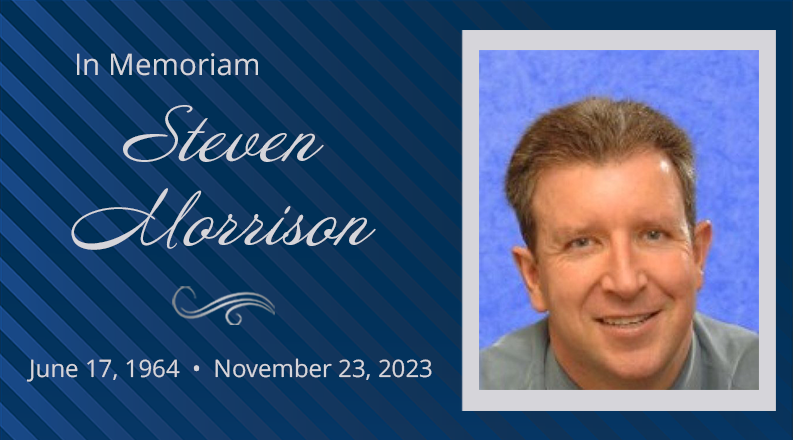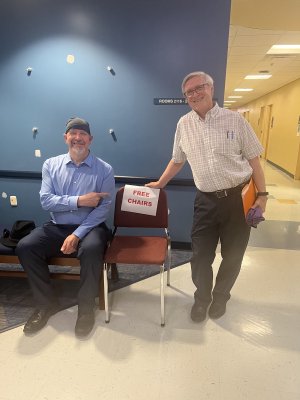Steven Morrison, who devoted much of his career at Old Dominion University researching fall risk and prevention, died Nov. 23 after a bout with skin cancer. He was 59.
Morrison came to the University in 2007 and served as a Batten Endowed Professor in the Department of Rehabilitation Sciences. He was named department chair in 2018.
He studied how humans control movements and how to address the breakdown of those movements caused by aging, injury or disease for decades. He collaborated locally with clinicians and researchers at the Strelitz Diabetes Center, Sentara Neurology Specialists and Children's Hospital of The King's Daughters.
He spearheaded the creation of Monarch Balance for Life, a structured assessment program that measures and identifies an individual's risk factors for falling. Morrison and his team collated this information to generate a personalized report containing an individual’s overall risk profile and suggestions for evidence-based interventions.
Among his innovative approaches was working with neurologists from Sentara Healthcare to incorporate fitness-tracking technology into socks as a way to track movement and detect early signs of trouble related to clinical disorders that impact walking.
“Steve poured a lot of his time” into the Monarch Balance for Life program, said Bonnie Van Lunen, dean of the College of Health Sciences.
Brittany Samulski, assistant professor in the Department of Rehabilitation Sciences, met Morrison in 2016 when she returned to ODU to pursue her Ph.D. in kinesiology and rehabilitation. She helped him launch Monarch Balance for Life.
“I had been doing falls risk assessment clinically in the hospital for five years, so we joined efforts to make the evidence-based, comprehensive falls risk assessments he had been using in research available to the Hampton Roads community,” she said. “We did this by offering quick assessments at community health fairs, piloting a program within an assisted living community and partnering with a local insurance company to offer comprehensive assessments to people at risk of falling. The assessments helped to streamline care for patients by identifying unique risk factors and allowing care managers to coordinate individualized follow-ups with healthcare providers to provide tailored interventions for each person.”
He also helped create ODU’s kinesiology and rehabilitation Ph.D. program and championed research in the College of Health Sciences.
“He was world-renowned for his theoretical and applied research in the field of motor control,” said Associate Professor Daniel Russell, who met Morrison when they were graduate students at Penn State University in 1996. “In his early work, he revealed a new understanding of tremor. Later, he contributed to understanding balance gait and falls. He studied the breakdown of motor skills in Parkinson’s disease, peripheral neuropathy and general aging.”
Morrison was born in Edinburgh, Scotland, in 1964 but grew up in New Zealand after his family moved there when he was a young child. He earned degrees in physiology, and motor control and biomechanics, from Otago University and his Ph.D. in motor control from Penn State.
Otago was important to Morrison for another reason – he met his wife, Denise, there. They married in 1998, and their son, Liam Finn, was born in 2001.
He worked at Simmons College in Boston (where he developed a love of the Red Sox) and at Griffith University on the Gold Coast of Australia before coming to ODU.
“Wherever he moved to, he made friends,” Russell said. “He was a larger-than-life character.”
He was also a man of many interests.
Morrison was avid about soccer and swimming. He loved the music of Pearl Jam, Simple Minds, Crowded House, George Michael and Duran Duran. He was a self-taught guitar player. And he enjoyed painting pictures from his life experiences and travels.
And he really loved Nespresso.
“He got so many of his colleagues and students hooked on drinking Nespresso coffee while talking through the details of a project or sharing ideas from a recent paper,” Samulski recalled.
“I will miss our coffee breaks and chats,” Russell added. “They were an important reminder to take a break and communicate with your friends.”
He also remained upbeat even when facing health challenges. He spoke with WVEC in 2022 about his kidney transplant from his sister in New Zealand.
“He always had a positive perspective on the road ahead, even though his health condition wasn't always what he wanted it to be,” Van Lunen said. “I will miss his wit and peaceful spirit. He truly was a friend to all.”
One of his enduring legacies will be the many students and faculty he mentored. “I have had more people than I can remember reach out this week and share a story about how he changed their life,” Samulski said.
She recounted one of his great lessons.
“One of the most valuable pieces of advice I received from him as a young academic was about how to define your identity in academia,” Samulski said. “He said that many academics think the key to success is setting themselves apart by being the smartest person in the room. The problem is that everyone in the room is smart. He encouraged setting yourself apart by being kind and showing compassion for others.”
The family will hold a private memorial from 2 to 4 p.m. Saturday that can be viewed via Zoom.
Additionally, the College of Health Sciences will honor Morrison’s memory during its winter gathering on Dec. 11 at the ODU Priority Club. Colleagues can submit photos by Dec. 6 at this link.
Click here to read his online obituary.




